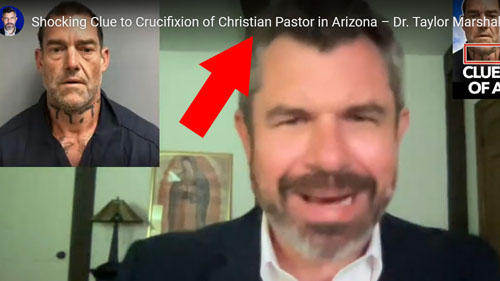| Recent Featured Videos and Articles | Eastern “Orthodoxy” Refuted | How To Avoid Sin | The Antichrist Identified! | What Fake Christians Get Wrong About Ephesians | Why So Many Can't Believe | “Magicians” Prove A Spiritual World Exists | Amazing Evidence For God | News Links |
| Vatican II “Catholic” Church Exposed | Steps To Convert | Outside The Church There Is No Salvation | E-Exchanges | The Holy Rosary | Padre Pio | Traditional Catholic Issues And Groups | Help Save Souls: Donate |  |









 " />
" /> " />
" /> " />
" /> " />
" /> " />
" />




The Best Argument Against "Baptism of Desire"
ARTICLE:
THE BEST ARGUMENT AGAINST “BAPTISM OF DESIRE”
BRO. PETER DIMOND
POINT 1 – THE GRACE CONFERRED BY THE SACRAMENT OF BAPTISM IS DOGMATICALLY DEFINED TO BE: • A GRACE THAT REMITS EVERY SIN AND ALL THE TEMPORAL PUNISHMENT DUE TO SIN • IT IS A GRACE THAT LEAVES A PERSON IN A STATE IN WHICH HE WOULD GO IMMEDIATELY TO HEAVEN IF DYING AFTER HAVING RECEIVED IT
The grace of Baptism, which completely regenerates the soul, is also called regeneration or being ‘born again’. The effect of this grace is the remission of every sin and all temporal punishment due to sin (de fide definita: see Florence and Trent below). Since the grace of Baptism not only remits all sin, but also all the temporal punishment due to sin, thus making the person a new creation (2 Cor. 5:17; Eph. 4:24), it’s certain that someone who would die immediately after receiving the grace of Baptism would go straight to Heaven. Someone dying in that state would not need to go to Purgatory or suffer any punishment for past sins. That was explicitly defined by the Councils of Florence and Trent.
POINT 2 – ‘BAPTISM OF DESIRE,’ AS DEFINED BY THEOLOGIANS WHO TAUGHT IT: • DOES NOT REMOVE THE TEMPORAL PUNISHMENT DUE TO SIN • DOES NOT LEAVE A PERSON IN A STATE IN WHICH HE WOULD GO STRAIGHT TO HEAVEN IF HE DIED • AND THEREFORE DOES NOT GRANT THE GRACE OF REGENERATION/BAPTISM/BEING ‘BORN AGAIN’
In attempting to explain the idea of ‘baptism of desire’ (which the Magisterium has never taught), St. Thomas Aquinas taught that the unbaptized catechumen who dies with the so-called ‘baptism of desire’ might still need to suffer punishment for past sins (pro peccatis praeteritis). He also explicitly said that such a person does not immediately attain (non statim pervenit) eternal life. But we just showed that it’s a dogma that the grace of Baptism leaves a person in a state in which he would go immediately (statim) to Heaven and would certainly not need to suffer any punishment for past sins. It’s a fact, therefore, that according to St. Thomas’ teaching, ‘baptism of desire’ does not grant the grace of the Sacrament of Baptism. Indeed, notice the amazing specificity with which St. Thomas’ statement about the so-called ‘baptism of desire’ directly contradicts the Council of Florence’s dogmatic teaching on the effect or grace of Baptism. The specificity of the contradiction in the original Latin is striking: it’s basically word for word. I will provide a summary of that contradiction below.
St. Thomas Aquinas On ‘Baptism of Desire’ VS. Pope Eugene IV (at Florence) Defining the Grace of Baptism
Latin- “Si quis ergo catechumenus sit habens desiderium Baptismi… decedens non statim pervenit ad vitam aeternam, sed patietur poenam pro peccatis praeteritis, ipse tamen salvus erit sic quasi per ignem, ut dicitur I Cor. III.”
St. Thomas Aquinas, Summa Theologiae, Pt. III, Q. 68, A. 2, Reply to Obj. 2: “If therefore a catechumen has the desire for baptism… then such a one departing [or dying] does not immediately attain eternal life but will suffer punishment for past sins. Nevertheless he himself will be saved in this way as though through fire, as stated in 1 Cor. III.”
Latin -“… sanctum baptisma, quod vitae spiritualis ianua est… Huius sacramenti effectus est remissio omnis culpae originalis et actualis, omnis quoque poenae, quae pro ipsa culpa debetur. Propterea baptizatis nulla pro peccatis praeteritis iniungenda est satisfactio: sed morientes antequam culpam aliquam committant, statim ad regnum coelorum et Dei visionem perveniunt.”
Pope Eugene IV, The Council of Florence, “Exultate Deo,” Nov. 22, 1439: “Holy baptism, which is the gateway to the spiritual life… The effect of this sacrament is the remission of every fault, original and actual, and also of every punishment which is owed for the fault itself. Therefore to the baptized no satisfaction is to be enjoined for past sins; but dying, before they commit any fault, they immediately (statim) attain the kingdom of heaven and the vision of God.”
It is beyond all dispute: St. Thomas taught that the so-called ‘baptism of desire’ DOES NOT confer the grace of the Sacrament of Baptism. His teaching on what ‘baptism of desire’ supposedly confers is EXACTLY THE OPPOSITE of what the Council of Florence and the Catholic Church declare the grace of Baptism to be. St. Thomas’ explanation of the supposed ‘baptism of desire’ contradicts the teaching of the Catholic Church on the grace of Baptism basically word for word. (Keep in mind that St. Thomas’ teaching is not infallible, while the teaching of the Magisterium is infallible.) The amazing specificity with which St. Thomas’ explanation of ‘baptism of desire’ contradicts Catholic teaching on the grace of Baptism is not just a coincidence. It was providential: God allowed the contradiction to be direct, and basically word for word, to demonstrate that the alleged ‘grace’ being put forward in theories for ‘baptism of desire’ is not the grace of Baptism. And therein lies its fatal flaw, as we will see.
St. Thomas' position that one can be justified without the grace of Baptism can also be found in other passages of the Summa Theologiae.
Notice, he taught that a man can receive the remission of sins (and thus be justified) before Baptism, but that this does not necessarily remit the entire punishment due to sin. But the grace of baptism/regeneration does remit the entire temporal punishment due to sin. St. Thomas therefore taught that the "grace" conferred by "baptism of desire" is inferior to, and different from, the grace conferred by Baptism. (Also note that when St. Thomas uses the word 'implicit' here, he doesn't mean that one can be saved by implicit faith in Christ. He held that explicit faith in the Trinity and the Incarnation was necessary. Rather, he uses 'implicit' in reference to the desire or expressed desire for baptism.)
Notice, according to St. Alphonsus, the so-called baptism of desire does not remove the temporal punishment due to sin. Like St. Thomas, he held that someone who died with baptism of desire might have to go to Purgatory. According to him, ‘baptism of desire’ does not grant the grace of Baptism or spiritual rebirth.
Following previous explanations of the theory, later theologians who accepted ‘baptism of desire’ also taught that it does not necessarily remit the temporal punishment due to sin. That proves that, according to their teaching, ‘baptism of desire’ DOES NOT confer the grace of Baptism/regeneration.
As we’ve shown, a so-called ‘grace’ that does not remit the entire temporal punishment due to sin is not the grace of Baptism/regeneration/rebirth.
POINT 3 – IT’S A DOGMA (AND THE CLEAR TEACHING OF SCRIPTURE) THAT ONE MUST HAVE THE GRACE OF REGENERATION/BAPTISM/BEING ‘BORN AGAIN’ (WHICH REMITS ALL THE TEMPORAL PUNISHMENT DUE TO SIN) IN ORDER TO BE JUSTIFIED AND SAVED • THIS PROVES, BEYOND ALL DOUBT, THAT ‘BAPTISM OF DESIRE’ (AS DEFINED BY THEOLOGIANS WHO TAUGHT IT) CANNOT JUSTIFY • IT’S A FALSE, MAN-MADE DOCTRINE THAT CONTRADICTS DEFINED DOGMA AND CLEAR SCRIPTURAL TEACHING ON WHAT IS NECESSARY TO BE JUSTIFIED AND SAVED
The Council of Trent dogmatically defined that one must be born again in order to be justified.
That means that you cannot even be put into the state of grace without receiving the rebirth of Jesus Christ. And the rebirth, as we’ve shown and the Council of Trent teaches repeatedly, takes away everything: the guilt of sin and all the punishment due to sin.
Here are two other interesting statements on the necessity of regeneration (or being born again) for salvation.
According to the Catholic Church, man cannot be rescued from the state of Adam except “through the purification of a new regeneration” (per novae regenerationis purificationem) and “by the providence of regeneration” (providentia regenerationis). Trent defined this as a dogma.
THE POSITION THAT ONE CAN BE SAVED WITHOUT REGENERATION (I.E. ‘BAPTISM OF DESIRE’) ALSO STANDS IN DIRECT OPPOSITION TO THE TEACHING OF THE NEW TESTAMENT ON JUSTIFICATION AND SALVATION
It is the clear teaching of Scripture that man must be regenerated in order to be justified and saved.
First justification is being "born of God." This regeneration or new birth from God, which one must have to be justified, is given through the Sacrament that Christ instituted. It can't be brought about by one’s charity, contrition, desire, shedding of blood, etc., as ‘baptism of desire’ and ‘blood’ posit. In fact, Scripture explicitly teaches that the rebirth one must have is not of man’s will or blood (John 1:13)!
To teach that one can be saved without being reborn, as ‘baptism of desire’ does, is to teach false doctrine. It is to contradict the New Testament and the Church’s dogmatic teaching. As Jesus said: “Wonder not, that I said to thee, you must be born again” (John 3:7).
NEW COVENANT FIRST JUSTIFICATION IS A NEW CREATION
Scripture teaches that first justification in the New Testament results in a new creation in which the person’s previous sins are remembered no more. Thus, it results in the full removal of the temporal punishment due to sin.
THE INSUPERABLE PROBLEM FOR ‘BAPTISM OF DESIRE’
Do you see the problem for baptism of desire?
For the idea of ‘baptism of desire’ to even begin to be in any way consistent with Catholic teaching, it would have to posit that baptism of desire grants the grace of Baptism and rebirth. But it doesn’t teach that, as the explanation of St. Thomas, St. Alphonsus, and others on the matter proves. God allowed the false idea of baptism of desire to contain this massive problem and inconsistency at its core so that people could eventually see it for what it is: a false doctrine. The facts we’ve considered prove that the theory of baptism of desire is over. It’s false.
WITH THIS ARGUMENT, QUICKLY END ANY DEBATE ON ‘BAPTISM OF DESIRE’
So, here’s how you end any debate on baptism of desire within a minute or two, with one question. When I say “end any debate”, your opponent may indeed stick around spewing falsehood and nonsense; but, once this argument is employed, his core assumptions and arguments will be pulverized, his entire line of argumentation will disappear and will have to be altered, and he will be caught in a fundamental contradiction.
Simply ask the supporter of baptism of desire the following:
If they don’t know what the grace of Baptism/spiritual rebirth is, explain that according to Catholic teaching, it’s the grace which remits all sin, all punishment due to sin, and leaves a person in a state in which he or she goes straight to Heaven if dying in that state (no Purgatory is necessary). Does baptism of desire give a person that state, yes or no?
Hence, whether they answer the question with yes or with a no, they prove baptism of desire to be false. That’s because it’s simply a theory of man that was never taught by the Church. It’s inconsistent with itself and it’s inconsistent with Catholic teaching because it’s a false doctrine of man.
SOME ADDITIONAL POINTS
So, according to them, the so-called baptism of blood provides one grace, while the so-called baptism of desire provides a different grace. Where has the Church ever taught any of this? The answer is nowhere. The Church teaches that there’s one baptism of water, which all in the Church have. That one baptism of water, which all in the Church have, is what must be faithfully confessed by all (Council of Vienne).
Also notice that in the first dogmatic passage above, the Council declares that this “one baptism” is “regenerating” (regenerans) all “baptized in Christ”. This is even more dogmatic proof that one must be regenerated to have the “one baptism”. A person must be regenerated to be in the unity of the Church and be saved. That further refutes ‘baptism of desire’, for ‘baptism of desire’ does not regenerate. Vienne’s proclamation demonstrates that only a baptism that regenerates is identified with the one baptism of Christ. Since ‘baptism of desire’ does not regenerate, it cannot be part of, or a kind of, the one baptism that all Christians have (Eph. 4:5). So much for the “three forms of the one baptism” argument. ‘Baptism of desire’ not only lacks the sacramental character of the one baptism of Christ; it lacks the very grace of the one baptism of Christ (regeneration). It is also not “celebrated in water”, as the baptism of all baptized in Christ is celebrated. It is not compatible with the one baptism that all in the Church have.
THE AUTHORITY OF THE MAGISTERIUM MUST BE FOLLOWED, NOT THEOLOGIANS, SAINTS OR DOCTORS WHEN THEY CONTRADICT IT
St. Peter and his successors were given the unfailing faith. It was not given to all members of the Church, all theologians, saints or doctors of the Church.
God allowed the false theory of baptism of desire to be taught by fallible theologians and in fallible organs because He allows errors to be circulated, but He protected the official declarations of the Church from teaching it. That’s why it doesn’t appear in any infallible decree. Moreover, while He allowed baptism of desire to be circulated in fallible sources, He left a massive and gaping hole at the heart of its explanation. This gaping hole proves that it cannot justify because it doesn’t provide spiritual rebirth.
To obstinately promote baptism of desire in the face of these facts is simply to be of bad will. It is to lie and to promote heresy. It is to promote a false doctrine. It is to believe and teach that people can be justified without being born again, contrary to the explicit teaching of the Catholic Church.
St. Augustine was a saint and doctor of the Church. He was not infallible. He wrote a book of Retractions. If you find a teaching in Augustine, you can’t just say, “It’s in Augustine. I’m going to hold it no matter what”, even if it doesn’t add up, even if it’s inconsistent with something of greater weight. No, you cannot just hold it. That’s a religion of man.
Not only is baptism of desire obviously false, as I’ve shown, but baptism of blood is false as well. It’s contrary to the dogmatic arguments we’ve covered in our material. That’s why baptism of blood was never taught by the Church. It’s literally nowhere to be found in the teaching of the infallible papal Magisterium. Moreover, I’ve shown that the view of St. Alphonsus, St. Thomas, etc. on baptism of desire is untenable and contrary to Catholic teaching. In attempting to explain his position on this issue, St. Alphonsus also misquoted the Council of Trent, as we proved in our article on the matter. He cited something the Council of Trent stated about the Sacrament of Penance, and the desire for the Sacrament of Penance, and he incorrectly applied it to water baptism. He was simply wrong. You are not permitted to hold his opinion or St. Thomas Aquinas’ opinion or any man’s opinion if it contradicts something of greater weight; and we know for a fact that their explanation of the theory is false. Indeed, the teaching that one must reject the views of doctors of the Church, if they prove to be incompatible with the Church’s declaration, is the very teaching of St. Thomas Aquinas himself.
This is a very interesting passage because some people will argue that the Church endorses the theology of St. Thomas. Yes, it endorses his theology in general; but, even if applied specifically, the theology of St. Thomas is that his opinions are not infallible and they must be set aside when a teaching of the Magisterium shows them to be lacking. His erroneous view on the Immaculate Conception is an example of such an opinion. This principle applies to any theologian or doctor of the Church. In fact, when supporters of BOD obstinately advance the position of St. Thomas or St. Alphonsus on this matter, in the face of the facts we’ve covered, they embarrass themselves. They make fools out of themselves; for they are obstinately making an argument, in the face of the facts, that people can be saved by baptism of desire from sources whose explanation proves that no one could be saved by baptism of desire; for you must be reborn to be justified.
Those who obstinately promote ‘baptism of desire’ in the face of these facts are simply promoting false doctrine against the teaching of the Church and will lose their souls.
AN EVER-SHIFTING TERM FOR A MAN-MADE THEORY
‘BAPTISM OF DESIRE’ AND ‘BLOOD’ NEVER FOUND THEIR WAY INTO AN INFALLIBLE DECREE OR COUNCIL BECAUSE THEY ARE FALSE
THE TRUE APOSTOLIC TEACHING ON BAPTISM, WHICH WAS REVEALED BY JESUS (JOHN 3:5) AND DEFINED BY THE CHURCH, CONTINUED TO BE TAUGHT BY THE MAGISTERIUM EVEN INTO THE MODERN PERIOD, IN THE OFFICIAL TEACHING OF PAPAL ENCYCLICALS; AND ‘BAPTISM OF DESIRE’ WAS NOWHERE TO BE FOUND
It should also be noted that baptism of desire and blood not only were never taught in any infallible or magisterial proclamation of the Church, but even if you consider the centuries after the Council of Trent leading up to Vatican II, and you consult the official teaching of popes in papal encyclicals to the universal Church, you will discover that never once were the false ideas of baptism of desire and blood taught. Even though papal encyclicals to the entire Church frequently dealt with Baptism, the Church, its necessity, etc. during a period of time when theologians were advancing the false ideas of baptism of desire and blood left and right, the papal encyclicals to the entire Church never taught baptism of desire or blood. The Holy Ghost continued to protect the official teaching of the Church from these false doctrines, even though God permitted the false doctrines to be circulated in fallible sources: the teaching of theologians, catechisms, etc. God permitted these errors to be taught in fallible sources, and He allowed people to misunderstand this issue, simply because, as 1 Corinthians 11:19 says, there must be heresies.
Eventually belief in the false doctrine of baptism of desire grew and expanded to such an extent that everyone who accepted the idea also held that you don’t need to believe in Jesus Christ and the Catholic faith to be saved. That is the position embraced or endorsed by every single proponent of ‘baptism of desire’ in our day. They hold that souls can be saved in false religions by a so-called ‘baptism of desire’. That’s why the problem at the heart of the false doctrine, which we’ve exposed in this article, won’t matter to many of them. They don’t care if their position is inconsistent. They are only concerned with believing something/anything that allows for salvation outside of Jesus Christ, His Church, and His Baptism. They use the false doctrine of baptism of desire simply as a false Christ, which supposedly saves people outside of Him and His faith. That position is completely heretical. It is contrary to the infallible teaching of the Church (see the dogmatic bull Cantate Domino from the Council of Florence). All supporters of baptism of desire in our day either believe in the aforementioned heresy or accept as Catholics people who believe in that heresy. Indeed, the promotion of this false doctrine in our day is the source of countless evils.
PAPAL ENCYCLICALS IN THE MODERN PERIOD MAINTAIN AND TEACH THE TRUE DOCTRINE; THEY CONFIRM OUR POSITION
It’s interesting to note that God not only never allowed the Magisterium to teach baptism of desire or blood, even in the years leading to Vatican II, but the Magisterium in that post-Trent, post-Vatican I period officially taught the same doctrine. It repeated the true doctrine of the Church: that no one can be a member of the Church without the Sacrament of Baptism, and that no one can be saved without it.
Pius XII officially teaches that if you have not received water baptism, you cannot be considered a member of the Catholic Church. That’s the exact same doctrine that we find in the infallible teaching of the councils. We see it repeated in the official teaching of the Magisterium after Trent and Vatican I. We don’t find baptism of desire or blood.
Pius XII specifically teaches that the Sacrament of Baptism distinguishes and separates all Christians (christianos omnes) from the rest. It distinguishes the baptized from non-Christians in the same way that the priest is distinguished from the rest of the faithful by the reception of the Sacrament of Order. According to the Magisterium, you cannot be a Christian without the Sacrament of Baptism; and only Christians are saved, as the Church dogmatically teaches. Hence, the exact same doctrine that we find in the infallible teaching of the councils is repeated here, in the official teaching of the Magisterium after Trent and Vatican I. We don’t find baptism of desire or blood.
Pius XI specifically teaches that men are unable to enter the Kingdom of God except through (nisi per) faith and baptism, which, he says, is an external rite. Since baptism of desire and blood are not external rites, he’s teaching that men are unable to enter Heaven without faith and the Sacrament or rite of Baptism. That’s the exact same doctrine that we find in the infallible teaching of the councils. We see it repeated in the official teaching of the Magisterium after Trent and Vatican I. We don’t find baptism of desire or blood.
The true doctrine on regeneration and Baptism, that no one at all can be saved without being born again of water and the Spirit, comes from the teaching of Jesus Christ Himself. We read Christ’s own words on this matter in John 3:5 and Mark 16:16. The truth is repeated throughout the epistles of St. Paul, in which, among other things, he declares that receiving water baptism is being saved ‘through the faith’ (Galatians 3:26; Ephesians 2:8-9; Colossians 2:12; etc.).
This true apostolic doctrine on the Sacrament of Baptism is contained in Scripture. It was taught by the fathers. It was infallibly declared by the ecumenical councils; and, as we just saw, it was infallibly repeated in the official teaching of the popes and the Magisterium, even in the recent decades and centuries when errors and heresies on this matter were spreading and abounding.
BY THEIR FRUITS YOU SHALL KNOW THEM
“By their fruits you will know them” (Mt. 7:16). Those who pay attention to our material should also be able to recognize that properly understanding and adhering to the apostolic truth about regeneration (being born again) – the importance and necessity of which are explained in this article – is not only what gives one the key to recognizing the fatal flaw in the false doctrine of ‘baptism of desire’. It also gives one the key to understanding the best, most direct, and most powerful way to refute the salvation doctrine of the entire Protestant ‘Reformation’. That was proven in these videos: Documentary: Protestantism’s Big Justification Lie (video); ‘Born Again’ Refutes ‘Faith Alone’ & The Demonic Possession of James White.
Understanding this apostolic truth, that regeneration leaves a person in a state completely free from all sin and from all punishment due to sin (‘immaculate’), also gives one the key to understanding the best biblical proofs for Mary’s Immaculate Conception (and her singular manner of being graced with the benefits of New Testament Redemption), which God left in the New Testament and the Bible. That was covered here: Mary’s Sinlessness: A Biblical Documentary.
SEVEN OTHER DOGMATIC ARGUMENTS THAT REFUTE ‘BAPTISM OF DESIRE’
The same Council teaches that all in the Church have the same baptism: “… one is the universal Church… outside of which absolutely (omnino) no one (nullus) is saved, one is the Lord, one is the Faith and one is the baptism of all.” Consider the two dogmatic statements from The Council of Vienne on baptism as a unit, as points A and B. A. All in the Church (outside of which no one at all is saved) have one and the same baptism; and B. That one baptism (which all in the Church have) is of water. Baptism of desire is therefore false.
Read or watch more about Pope St. Siricius’ decree here: The Oldest Surviving Papal Decree (of Pope St. Siricius) Refutes 'Baptism of Desire' (article and video)
Outside the Catholic Church There Is Absolutely No Salvation (this is our full book –it refutes all the objections people advance on this issue, and we update it with new points as time permits)
• As these facts prove to anyone of good will, the Catholic Church teaches that no one can be saved without the regeneration of water and the Spirit in the Sacrament of Baptism. To promote the false idea of ‘baptism of desire’ or ‘baptism of blood’ in the face of these facts is simply to deny Catholic teaching and be of bad will.
Sign up for our free e-mail list to see future vaticancatholic.com videos and articles.
Recent Content
^